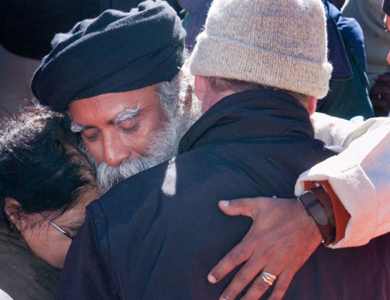Of Love and Oneness

“There is a certain beauty to human emotions. Emotions are the strongest force in most people – even in those who believe they are intellectual.”
—Sadhguru
Lyricist and scriptwriter Prasoon Joshi in conversation with Sadhguru on love and a sense of oneness.
On 12 January 2016, lyricist and scriptwriter Prasoon Joshi met Sadhguru in Mumbai for a free-flowing interaction about marketing, culture, love, and many other topics. Here is an excerpt of their conversation, with Sadhguru’s insights on love and a sense of oneness.
Prasoon Joshi: Is it possible to love a mortal being and, by doing so, feel oneness with God? Or is this just a romantic notion?
Sadhguru: If I may dissect love…. There is a longing in every human being to be something more than what they are right now. If the only thing that you know is your body, it will find expression as sexuality. You may give all kinds of colors, names, and moral structures to your sexuality, but fundamentally, you are trying to make something or someone that is not you, a part of you. For a moment, it may feel like that, but the next moment, it is gone. If this same longing to include someone or something as a part of you finds an emotional expression, you say you are in love with someone. If you compare how long a physical union lasts and how long the sense of emotional oneness with someone lasts, the latter has a longer lifespan.
Physical union is only momentary, while on an emotional level, you can make the sense of oneness last for days, months or years, if you are willing. If you look at the many romantic stories in lore and literature, we eulogize someone who holds on to an emotional union for a period of time, because when people are in love, they are so beautiful. They look like they are floating in the clouds. There is a certain beauty to human emotions. Emotions are the strongest force in most people – even in those who believe they are intellectual. By contrast, a true intellectual has near to no emotions in him, because he is so fascinated with his intellect.
Since we are talking about man-woman relationships – let us say a man and a woman are seriously engaged with each other. But then, one of them finds a wonderful book. Suddenly, fictive characters, mere words printed on paper, become more interesting and engaging than this beautiful woman or this wonderful man who is sitting next to them. It actually happens in relationships that one partner becomes jealous of the other one’s books. Once the intellect is fired up in a certain way, emotions recede. Intellect is dry, but it has a different kind of sparkle. It makes the world transparent.
If you use your intellect properly, it will give you access to things that you never thought possible. Because of this, the intellect has more fascination. Emotions have more beauty and color. But if they turn negative, they are the ugliest things. When people are emotional, you can see the most wonderful side of them, or you can see the ugliest side of them. That is the nature of emotions. At the same time, the way you think is the way you feel. You cannot think one way and feel another way. If, for example, you think, “She’s so wonderful,” your emotions for her will be sweet.
Prasoon Joshi: That may happen sporadically, or is what we think in our control? Are thoughts just sprouting in our heads, or can we direct our thoughts?
Sadhguru: It depends on what you have done with yourself. Your thoughts should be directed by you – only then they are sensible. Thoughts do not spring up out of nowhere. They arise from the data that you have gathered. You can only produce permutations and combinations of the existing information. How exquisitely and dexterously you do that depends on the kind of mind you have. This does not mean you have access to anything other than the gathered data. But back to your question – can your love affair make you touch another dimension?
Essentially, it all comes down to a longing to include something that is not you as a part of yourself. This means there are boundaries – the boundaries of your sensations. You consider what is within the boundaries of your sensation to be “you”, and what is outside the boundaries of your sensation not to be you. Whatever body weight you have now, all these kilograms were food that was somewhere outside of you at some point. You have slowly gathered this body by ingestion. Once the food that you eat gets integrated within the boundaries of your sensation, you consider it as yourself. But suppose you lose weight, you will not go searching for these few kilograms as if you lost a part of yourself, because once they are outside the boundaries of your sensation, they have got nothing to do with you.
So, whether it is sexuality, a love affair, ambition, greed, conquest, spirituality, or devotion – essentially, you attempt to break the limitations of your sensory body and experience something else or someone else as a part of yourself. In one way or the other, you do this every day. For instance, when you drink water, it becomes a part of you. If you use your intellect, your emotion, your body, or your energies, you splice through your sensory body and experience something else or someone else as a part of you. That means you are in a state of yoga. If you do it through your body, we call it karma yoga. If you do it through your intellect, we call it gnana yoga. If you do it through your emotions, we call it bhakti yoga. If you do it through your energies, we call it kriya yoga. These are all the ways in which you can achieve a state of yoga.
Editor’s Note: More of Sadhguru’s insights on love and human emotion in “Emotion: The Juice of Life.” Purchase the ebook at Isha Downloads.
A version of this article was originally published in Isha Forest Flower. Download as PDF on a “name your price, no minimum” basis or subscribe to the print version.


